You might think that a sharp-talking, cross-dressing potter-artist with a teddy bear obsession would present a challenge to the British public. Not a bit of it. Grayson Perry is music hall, he’s pantomime – there’s even a touch of Brideshead in the teddy bear thing. One of Britain’s most intelligent and articulate artists, Perry was barely in the public eye before he was hived off into that comfort zone the British reserve for the loveable eccentric. And his articulacy is itself a problem: the fact that most of what he says makes perfect sense means he can’t hide behind waffling obfuscation, like 90 per cent of contemporary artists. While this has hardly harmed his public renown - nor, I dare say, his prices - it does mean his work tends to get overlooked.
Like many of Perry’s objects – probably too many – it depicts Alan Measles
This foray into the British Museum’s gigantic collection might appear a stop-gap project, yet it’s a far richer and more rounded experience than your average contemporary-artist-deigns-to-respond-to-a-collection show, and there’s far more of the artist himself in it. With Treasures of Heaven, the BM’s spectacular look into the world of medieval relics and pilgrimages, about to close in the gallery immediately below, Perry's show takes us into similar psychic territory with a hyper-contemporary edge.
 The first thing we see is Perry’s painted Harley Davidson, with "Humility" written across its petrol tank, a portable shrine to his 50-year-old teddy – Alan Measles – on the back. "I often hear people say they’re not very religious, but have a spiritual side," Perry has said. "Well, I’m not very spiritual, but I have a religious side. Religion is about people getting together." I heard the philosopher John Gray say something very similar on Radio 4 the other night: religion isn’t about belief, but social behaviour. In the face of po-faced Dawkinist orthodoxy, religion as partying – in the medieval, Mexican Day of the Dead, Sufi self-flagellating sense – couldn’t be more on trend, and here Perry proposes his teddy, Alan Measles, and his transvestite alter ego Claire as part of a new Pantheon of Facebook Age saints.
The first thing we see is Perry’s painted Harley Davidson, with "Humility" written across its petrol tank, a portable shrine to his 50-year-old teddy – Alan Measles – on the back. "I often hear people say they’re not very religious, but have a spiritual side," Perry has said. "Well, I’m not very spiritual, but I have a religious side. Religion is about people getting together." I heard the philosopher John Gray say something very similar on Radio 4 the other night: religion isn’t about belief, but social behaviour. In the face of po-faced Dawkinist orthodoxy, religion as partying – in the medieval, Mexican Day of the Dead, Sufi self-flagellating sense – couldn’t be more on trend, and here Perry proposes his teddy, Alan Measles, and his transvestite alter ego Claire as part of a new Pantheon of Facebook Age saints.
If this sounds like the build-up to an orgy of Eministic Me Art, what we get is a glorious assortment of treasures cunningly interspersed with Perry’s specially created works. A magnificently primal Malian "power object" in the form of an abstracted bull Picasso would have been proud to have created stands near a bronze Day of the Dead skull studded with "branded" British imagery: a London bus, the BM’s own Lewis Chessmen. A Ghanaian headdress in goatskin and beaten gold, so outré you feel it must be the work of some postmodern fashion designer, appears alongside a rusting cast-iron figure of a horseman, vaguely Haitian in appearance. Like many of Perry’s objects – probably too many – it depicts Alan Measles.
 If it all sounds a little too close to the Chapman Brothers’ nihilistic appropriations of Goya etchings and primitive sculpture, what’s striking in Perry’s work is the real affection for the forms he parodies, an instinctive feeling for materials and an almost unnerving skill for getting under the skin of alien vernacular forms. (Pictured left, Head of Fallen Giant.)
If it all sounds a little too close to the Chapman Brothers’ nihilistic appropriations of Goya etchings and primitive sculpture, what’s striking in Perry’s work is the real affection for the forms he parodies, an instinctive feeling for materials and an almost unnerving skill for getting under the skin of alien vernacular forms. (Pictured left, Head of Fallen Giant.)
The exhibition works best when there’s a sense of Perry really getting inside the museum collection, insidiously blurring the boundaries between its objects and his own. In Our Father and Our Mother two rusting cast-iron pilgrim figures, the male oriental, the female African, step forward, weighed down with great piles of baskets, sewing machines, ghetto blasters and guns. They’re so stylistically pitch-perfect, the male belongs in a convincingly oriental idiom, the female in an African – yet they work beautifully as a pair. Even the way they’re lit is totally British Museum (well, this is the British Museum).
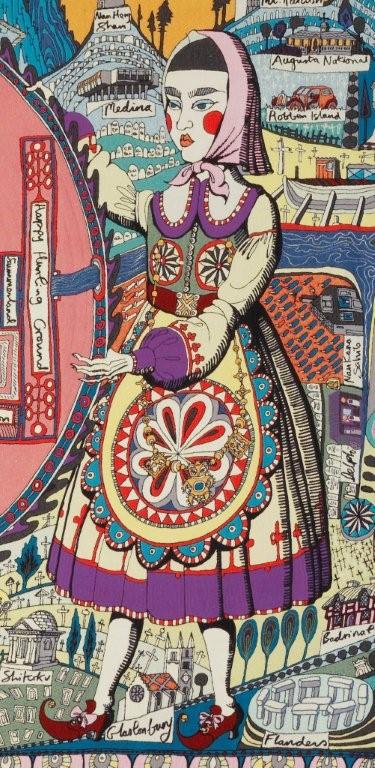 The exhibition’s two flagship pieces, while clever, are slightly less compelling. The large tapestry, Map of Truths and Beliefs (pictured right), centres on a plan of the BM as a kind of Tantric mandala, filled with names for paradise – heaven, nirvana, Shangri-la – held up by a slathering wolf and Perry’s transvestite alter ego Claire in Russian peasant garb. In the background a map indicates modern pilgrimage sites, from Angkor Wat to Wembley and Graceland. Although beautifully executed, it’s part of a riff on culture, heritage and consumerism that Perry has extensively explored before. Similarly, the exhibition’s title piece, a cast-iron sailing ship festooned with rusting forms echoing iconic objects from the museum’s collection, tells us things about appropriation and the movement of cultures that anyone attending the average modern PC primary school will know.
The exhibition’s two flagship pieces, while clever, are slightly less compelling. The large tapestry, Map of Truths and Beliefs (pictured right), centres on a plan of the BM as a kind of Tantric mandala, filled with names for paradise – heaven, nirvana, Shangri-la – held up by a slathering wolf and Perry’s transvestite alter ego Claire in Russian peasant garb. In the background a map indicates modern pilgrimage sites, from Angkor Wat to Wembley and Graceland. Although beautifully executed, it’s part of a riff on culture, heritage and consumerism that Perry has extensively explored before. Similarly, the exhibition’s title piece, a cast-iron sailing ship festooned with rusting forms echoing iconic objects from the museum’s collection, tells us things about appropriation and the movement of cultures that anyone attending the average modern PC primary school will know.
Perry’s "fantasy world" – his term – embodied by his alter egos Claire and Alan Measles, is amusing enough in a bonkers camp way, but it doesn’t carry quite the metaphorical weight he would like it to. The message of this show is that his work is most interesting when he looks out from, rather than into, himself.
- Grayson Perry: The Tomb of the Unknown Craftsman at the British Museum until 19 February, 2012

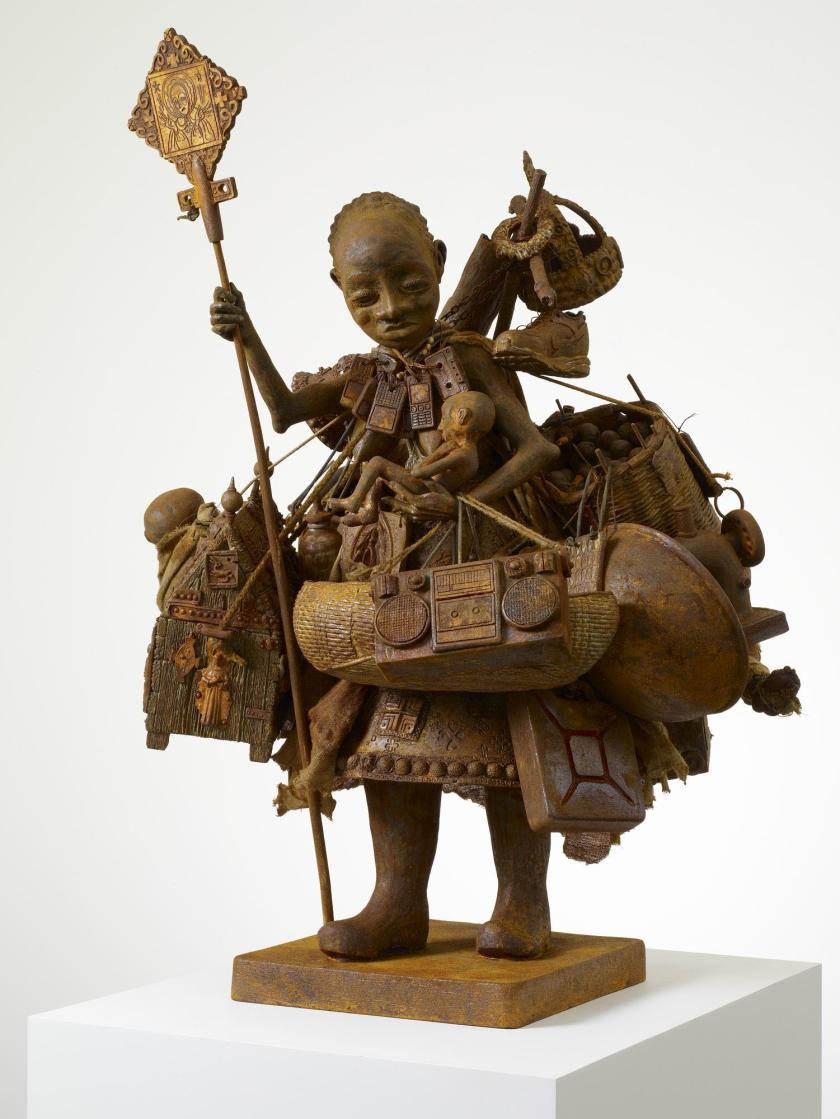


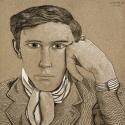
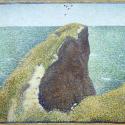
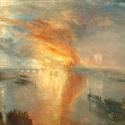

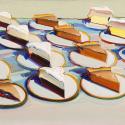


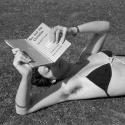
![SEX MONEY RACE RELIGION [2016] by Gilbert and George. Installation shot of Gilbert & George 21ST CENTURY PICTURES Hayward Gallery](/sites/default/files/styles/thumbnail_125_x_125_/public/mastimages/Gilbert%20%26%20George_%2021ST%20CENTURY%20PICTURES.%20SEX%20MONEY%20RACE%20RELIGION%20%5B2016%5D.%20Photo_%20Mark%20Blower.%20Courtesy%20of%20the%20Gilbert%20%26%20George%20and%20the%20Hayward%20Gallery._0.jpg?itok=3oW-Y84i)
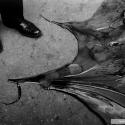
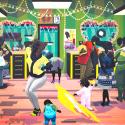
Add comment